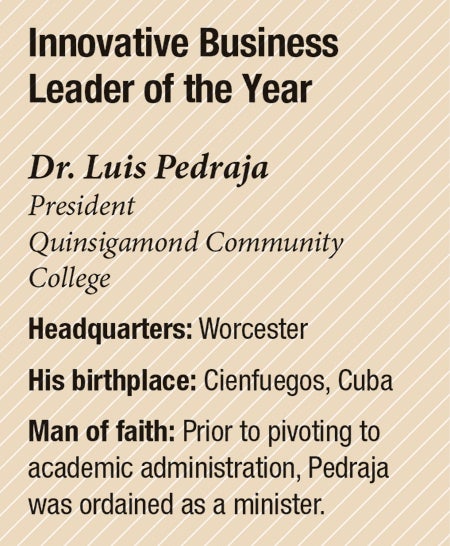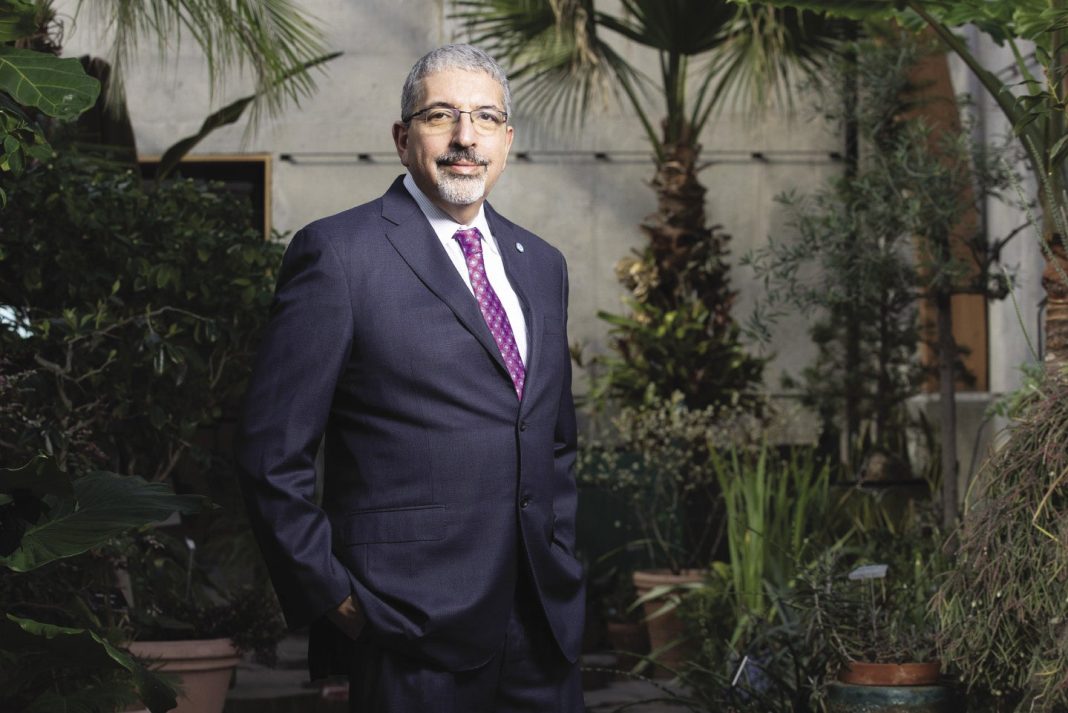Dr. Luis Pedraja may be president of Quinsigamond Community College, but the choices he makes as head of the Worcester school have impacts far beyond campus.
This is true on any given day, as a non-residential school serving commuter students, many of whom, said Pedraja, work as first responders and in other essential workforce fields, but it is especially true during a global pandemic.

“Our students are very dedicated, hard working,” Pedraja said. “They’re driven, but they also have challenges. They’re single parents trying to work to support their kids while getting an education. They might be working two or three jobs. They might be living in situations or taking care of elderly family members that cannot work.”
Not only did Pedraja’s quick and thoughtful responsiveness help his student and QCC as the coronavirus pandemic wreaked havoc on all aspects of society, but he was among the most outspoken leaders in the Central Massachusetts business community in the racial crisis that unfolded after Minneapolis police killed George Floyd in May.
His commitment to social justice was the main reason he left the classroom early in his career to become an administrator and later why he choose to work at community colleges, instead of other areas of higher education.
“I always tell people that a lot of colleges create barriers. They’re gatekeepers weeding out people who might not belong in college,” Pedraja said. “At community college, that’s not our role. Our role is to… empower students. We’re not building barricades or dead ends — we’re on-ramps.”
Pedraja, himself a first-generation college student who immigrated from Cuba to the United States as a child, growing up in an impoverished neighborhood in inner-city Miami, knows well the unique challenges many of his students face. But he also knows how life-changing access to higher education can be, especially for those whom it is not easily accessible.
Growing up, he said, his parents lost everything when they immigrated to the United States. They urged him to study hard because education was the one thing that couldn’t ever be taken away from him.
“I shared this because it’s one of those defining moments that affected my perspective, career choices, and my focus on education,” Pedraja said. “And also, what motivates me in my leadership, to help others have the same opportunity that I’ve had, because education opened up doors for me that I did not ever imagine would be open or even possible.
In that way, he said, he views his job as an educator as a chance for him to pay it forward.
“I want to serve those particularly who have been left behind, who are underserved, and traditionally been unable to access education, so they can have the same opportunity,” Pedraja said.
That vantage point bore on Pedraja as he and his team made the decision last March to move QCC’s educational programming almost entirely online, and again, later to extend that choice through the entire 2020-2021 academic year — decisions announced and committed to far in advance of most of the school’s peer institutions. While other colleges and universities in Central Massachusetts debated the relative wisdom and safety of bringing students to campus, and sometimes found themselves forced to backtrack on premature plans as the unsparing coronavirus reared its head in dorms and classrooms, QCC remained steadfast in its decision to keep its community physically separated.
“Our students come and go,” Pedraja said. “And they’re in the community, so they’re not only bringing infection to campus. but they can get infected and take it out into the community.”
In turn, the school began discussing the possibility of going remote as early as January, and moved to set up relief programs to help students deal with challenges stemming from the pandemic, raising more than $100,000 in emergency assistance funding in the first several months of 2020 and establishing a drive-thru food pantry.
Since he joined QCC in 2017, Pedraja has been a leader in advocating for equality and racial justice. He was among the first in Central Massachusetts to openly criticize former U.S. President Donald Trump when Trump supported the white supremacists at a rally in Charlottesville, Va. in 2017.
After George Floyd was killed by Minneapolis police on Memorial Day, Pedraja spoke out in the following days, releasing a statement with QCC Police Chief Kevin Ritacco.
“I’ve struggled for days to find words that can express the unbearable sorrow, anger, and frustration that I feel in every fiber of my being; my soul aches,” Pedraja said in the statement. “Maybe that is for the best. Words are cheap when lives are at stake; they fall on deaf and uncaring ears.”
In his message, Pedraja suggested the actions of one police officer shouldn’t discredit the valor and dedication of the larger police force, but said slow responses to those actions are alarming. He argued the onus is on educational institutions to act as conduits for understanding and progress.
“Throughout history, colleges and universities often led the way, sowing the seeds of knowledge and freedom, reinventing our world, and serving as a catalyst for change,” Pedraja said. “I believe in the power of education to effect change. Through education we can lift the veil of lies, ignorance, and fear that has descended upon us.”
While in hindsight heading a community college seems like a clear fit for Pedraja, it was not always his plan, exactly. Originally, he said, he saw himself becoming a minister, going so far as to be officially ordained. He studied religion as an undergraduate at Stetson University in Florida and obtained a doctorate in philosophy and theology from the University of Virginia.
For many years, Pedraja said, he taught philosophy. But after spending extensive time in the classroom, he determined his commitment to social justice would be better served by taking on a different role – that of administrator.
In 2000, he accepted a position as vice president of academic affairs at Memphis Theological Seminary, and then as vice president of Middle States Commission on Higher Education, an accreditation nonprofit working with colleges and universities both domestically and internationally, headquartered in Philadelphia.
It was through his work with Middle States he met Javier Cevallos, now president of Framingham State University. The pair, first introduced in entirely different circumstances while working entirely different jobs, did not know they would one day both be heads of public colleges in Central Massachusetts, a short drive away from one another.
Now colleagues and friends for 20 years, Cevallos spoke at Pedraja’s inauguration as QCC’s president in 2018.
“From the moment when I met him in Pennsylvania, we had to do some crazy visits that were a little challenging, and one thing that impressed me at the time is that one of his qualities is how level-headed and even tempered he is, and he takes things in stride,” Cevallos said of Pedraja. “He can cool things down and analyze them and use logic and bring people together in wonderful ways, from positions that seem to be, at some point, irreconcilable.”
Those qualities have helped Pedraja keep his campus focused and faculty morale high as the school continues to navigate fallout from the coronavirus pandemic, Cevallos said.
After working with Middle States, Pedraja later served in administrative capacities at Antioch University in Los Angeles, where he was provost and vice president of academic affairs, and then later at Peralta Community College District in Oakland, Calif., where he served as interim vice chancellor of academic affairs. It was around this time Pedraja realized working at community colleges blended his expertise in education with his deeply embedded social justice values and priorities.
And so, when the opportunity to apply for the presidency at QCC arose, he saw it as an opportunity to commit to supporting students who, in many cases, had similar backgrounds to his.
“Community colleges now, they are not just about education,” Pedraja said. “They also provide a lot of social services to our students and connect them with some other services that they need to succeed.”
That holistic perspective has defined his leadership approach at the Worcester school, and it’s not gone unnoticed.
“Luis has been a valued partner as we discuss how our region’s public institutions can collaborate to serve our students,” said Fitchburg State University President Richard Lapidus, noting he speaks regularly with Pedraja, as well as the presidents of Worcester State University and Mount Wachusett Community College in Gardner, particularly with regard to agreements allowing students to transfer credits between institutions.
“I have always appreciated Luis’s commitment to student success and his embrace of collaboration as a means to help them accomplish their goals,” Lapidus said.

